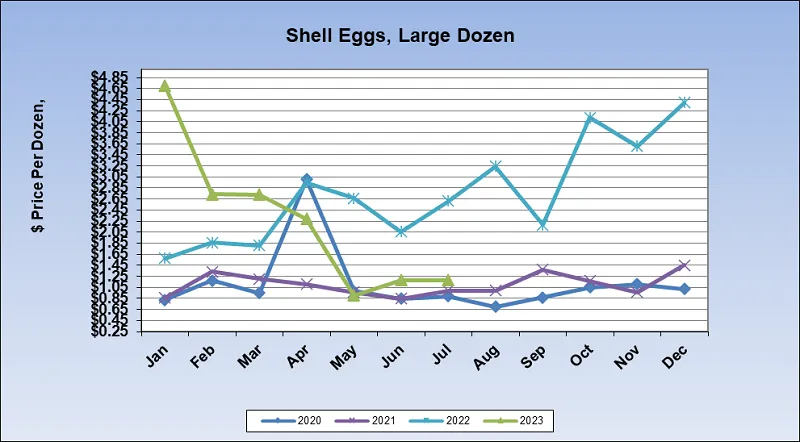Q&A with Dave Kourie and Henry Zerby
Wholesale egg prices soared over the last year, peaking near $5.00/dozen, driving up costs for foodservice operators across the country. But we’re finally seeing the sunny side as prices start dropping. Does this mean we can all stop walking on eggshells when it comes to ordering eggs? Are they, in fact, going to be cheaper by the dozen?
For perspective, we spoke with Chief Procurement Officer Dave Kourie and VP of Supply Management Dr. Henry Zerby and asked the hard questions we all want answers to.
What’s happening with egg prices, and will the price declines continue?
Kourie: “Likely the main reason egg prices are coming back down is that the poultry industry is recovering from the bird flu outbreak. Tens of millions of birds across the country were impacted, and we felt that trickle down to the supply and cost of eggs,” said Kourie.
“But the Highly Pathogenic Avian Influenza (HPAI) has been a non-factor for eggs in calendar year 2023; bird flocks look to be back to near-full strength by the end of the summer. Eggs are well on their way to recovery and, as the flock matures, there may be some additional upside in production. This has supported egg prices reducing to pre-COVID levels and it is projected to remain low for the rest of the year.”

How is inflation playing a role – or not – with the cost of eggs?
Kourie: “Inflation continues to moderate and will likely continue to slow through 2023; however, food inflation is still elevated (+7.6% vs. last year). Eggs Indices are at -0.4%, a decrease of -13.8% from April; this is the largest decrease in this index since January 1951. We see a mix of factors, not just inflation. The decrease is due to a slowing in the spread of the bird flu, supply increases and shoppers starting to buy less. The demand dropped.”
With egg prices stabilizing, should hospitality businesses look to put more eggs on menus in place of other items that could be seeing increases?
Zerby: “Eggs can be used within different diets and menus as a means of managing prices. They are flexible enough for all dayparts, increasingly giving operators an affordable option to include on their menus.
Furthermore, eggs are an excellent source of nutrients: they are high in protein and contain all essential amino acids, they are also a great source of minerals and vitamins. Eggs contain all vitamins but vitamin C and are one of nature’s best sources of choline, a B vitamin that can help support cognitive ability.”
Will the decrease in egg prices be offset by increases in other areas and that's something that hospitality businesses should factor in when pricing and considering their margins?
Zerby: “The decrease in egg price is a welcome opportunity as we see other proteins in the market basket seeing pricing pressure. Beef prices are expected to remain elevated as the nation herd is at its lowest point in decades from the recent multi-year drought in the west and great plains.
Additionally, pork is seeing pricing pressure, especially in California due to Prop-12 regulations and in Massachusetts associated with Question 3 regulations (similar legislation as Prop 12). More recently a similar bill to that of Prop 12 was introduced in New York. The reduced egg prices provide some opportunities to strategically meet protein targets while managing menu/tray price.”
Entegra’s supply chain and economic experts work together to provide you with regular commodity pricing and inflation updates. Our Supply Management team has also recently published The Cost Outlook report to prepare you to make the best purchasing decisions for your hospitality-driven business.
Call us at 833-977-1765 or contact us to get more information about putting Entegra’s purchasing power to work for you.
July 31, 2023
